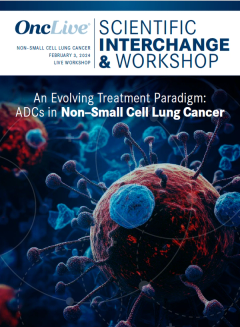
Dr Leal on the Utility of Patritumab Deruxtecan in EGFR+ NSCLC
Ticiana Leal, MD, discusses the investigation of patritumab deruxtecan in the HERTHENA-Lung01 study in advanced EGFR-mutated non–small cell lung cancer.
Episodes in this series
Ticiana Leal, MD, associate professor, director, Thoracic Medical Oncology Program, Department of Hematology and Medical Oncology, Emory University School of Medicine, Winship Cancer Institute, discusses the investigation of the HER3-directed antibody-drug conjugate (ADC) patritumab deruxtecan (HER3-DXd) in the context of the phase 2 HERTHENA-Lung01 study (NCT04619004) in patients with advanced EGFR-mutated non–small cell lung cancer (NSCLC) following progression on prior treatments.
Leal begins by stating that investigators have conducted an evaluation of HER3-DXd in patients with NSCLC, noting that HER3 overexpression is prevalent in advanced NSCLC. Specifically, within the confines of HERTHENA-Lung01,
The safety profile of HER3-DXd aligns largely with the expected toxicities associated with ADCs, Leal expands. Predominantly, hematologic toxicities were observed; most were seen early in treatment, and most were transient without significant clinical ramifications, she states. For instance, the incidence of febrile neutropenia remained relatively low, Leal imparts.
Importantly, these findings have spurred the initiation of the phase 3 HERTHENA-Lung02 study (NCT05338970), which is a randomized trial that aims to assess the efficacy and safety of HER3-DXd vs platinum-based chemotherapy in patients with EGFR TKI–resistant NSCLC, she continues, adding that the study will adopt a 1:1 randomization between the HER3-DXd and chemotherapy arms. Accrual for this study has been completed, anticipation for forthcoming results is high, and findings may be unveiled in upcoming meetings, Leal concludes.







































